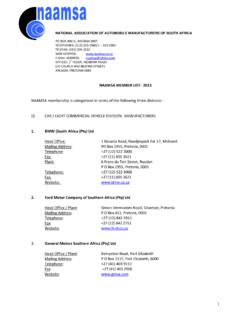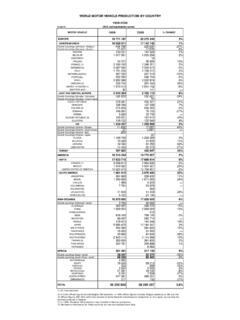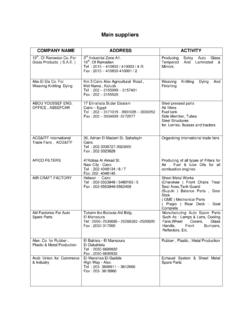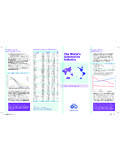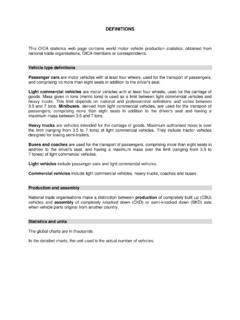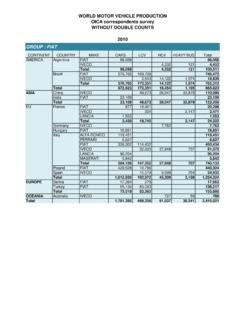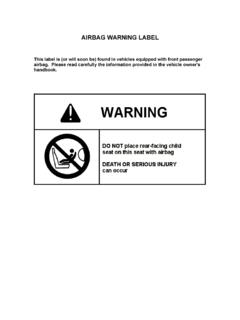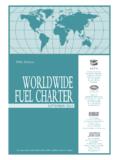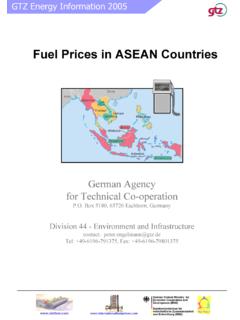Transcription of First edition ETHANOL GUIDELINES - OICA
1 ETHANOL GUIDELINESFrom the worldwide fuel Charter CommitteeMARCH 2009 First edition For copies, please visit the association websites. european automobile Manufacturers AssociationRue du Noyer 211, B-1000 Bruxelles, Belgium Tel: 32 (2) 732-5550 Fax: 32 (2) 738-7310 of automobile Manufacturers1401 Eye Street, , Suite 900 Washington , 20005 Tel: 1 (202) 326-5500 Fax: 1 (202) Manufacturers AssociationTwo North LaSalle Street, Suite 1700 Chicago IL, 60602 Main Telephone: 1 (312) 827-8700 Facsimile: 1 (312) automobile Manufacturers AssociationJidosha Kiakan 1-30, Shiba Daimon 1-Chome Minato-ku, Tokyo 105-0012 Japan Tel: +81-3-5405-6125 Fax: + european automobile Manufacturers Association Alliance of automobile Manufacturers Engine Manufacturers Association Japan automobile Manufacturers Association March 2009 Subject: worldwide Biofuels Harmonisation Dear ETHANOL GUIDELINES Recipient.
2 On behalf of automobile and engine manufacturers from around the world, we are pleased to present this First edition of ETHANOL GUIDELINES from the worldwide fuel Charter (WWFC) Committee. We created the WWFC in 1998 to promote greater understanding of the impact of fuel quality on engine and motor vehicle emissions and performance and to promote harmonization of fuel quality worldwide in accordance with engine and vehicle needs in different markets. Rapid growth in the use of ETHANOL and biodiesel has prompted the WWFC Committee to address the need for more information about these important renewable fuels. As with conventional gasoline and diesel fuel , biofuel quality must match the needs and capabilities of engine and vehicle technologies, especially as these technologies become more advanced to meet ultra clean emission standards. This document provides our guidance on ETHANOL quality; a companion document provides guidance on biodiesel quality.
3 Given the wide variation in performance and measurement methods of biofuel blends at different blend levels, these guidance documents focus on the quality of the blendstock used to make finished biofuel blends, rather than on the finished fuels themselves. Specifically, we created this document to guide blenders who produce and use 100% ETHANOL and gasoline blendstocks to make finished 10% ETHANOL blends. The resulting finished fuels should continue to meet the recommendations contained in the WWFC for the various categories of market fuels. The use of ETHANOL and biodiesel fuels is important to help extend supplies of gasoline and diesel fuel . As renewable fuels, they have the potential to help reduce emissions of greenhouse gases. Proper formulation also can help assure lower emissions of conventional pollutants. The key to achieving low emissions is to sustainably produce good quality blendstocks and to blend and distribute the finished fuels in a way that preserves their quality when they reach the consumer.
4 This document represents our best collective judgment at this time, based on experience with ETHANOL produced from conventional feedstocks, such as corn and sugarcane, and aided by comments from interested parties. We recognize that technical information will continue to evolve, so this document will also change over time as we learn more. We appreciate the efforts of those who provided information and comments, and we are especially grateful to those who expressed support for this endeavor. We look forward to working with you to support the development and use of high quality renewable fuels for the benefit of consumers and the environment worldwide . Ivan Hodac Secretary General ACEA Dave McCurdyPresident & CEO Alliance Jed R. MandelPresident EMA Yoshiyasu NaoPresident JAMA ii List of Members ACEA member companies BMW Group, DAF Trucks NV, Daimler AG, Fiat , Ford of Europe GmbH, General Motors Europe AG, MAN Nutzfahrzeuge AG, Porsche AG, PSA Peugeot Citro n, Renault SA, Scania AB, Toyota Motor Europe, Volkswagen AG, AB Volvo.
5 Alliance member companies BMW of North America, Chrysler LLC, Ford Motor Company, General Motors Corporation, Jaguar Land Rover, Mazda North American Operations, Mercedes Benz USA, Mitsubishi Motor Sales of America, Inc., Porsche Cars North America, Inc., Toyota Motor North America, Inc., Volkswagen Group of America. EMA member companies American Honda Motor Co., Inc., Briggs & Stratton Corporation, Caterpillar Inc., Chrysler LLC, CNH Global , Cummins Inc., Daimler Trucks North America LLC, Deere & Company, Deutz Corporation, Dresser Waukesha, Fiat Powertrain Technologies , Ford Motor Company, General Motors Corporation, Hino Motors, Ltd., Isuzu Manufacturing Services of America, Inc., Kohler Company, Komatsu Ltd., Kubota Engine America Corporation, MTU Detroit Diesel, Inc., Navistar, Inc., Onan Cummins Power Generation, PACCAR Inc, Scania CV AB, Volkswagen Group of America, Inc., Volvo Powertrain Corporation, W rtsil North America, Inc.
6 , Yamaha Motor Corporation, Yanmar America Corporation JAMA member companies Daihatsu Motor Co. Ltd., Fuji Heavy Industries Ltd., Hino Motors Ltd., Honda Motor Co. Ltd., Isuzu Motors Limited, Kawasaki Heavy Industries Ltd., Mazda Motor Corporation, Mitsubishi Fuso Truck and Bus Corporation, Mitsubishi Motors Corporation, Nissan Diesel Motor Co. Ltd., Nissan Motor Co. Ltd., Suzuki Motor Corporation, Toyota Motor Corporation, Yamaha Motor Co. Ltd. Associate members Association of International automobile Manufacturers (AIAM) Association of International Automotive Manufacturers of Canada (AIAMC) Associacion Mexicana de la Industria Automotriz, (AMIA) Brazilian Association of motor vehicle and motorised agricultural machinery manufacturers (ANFAVEA) Canadian Vehicle Manufacturers Association (CVMA) Chamber of Automotive Manufacturers of the Philippines, Inc. (CAMPI) China Association of automobile Manufacturers (CAAM) Indonesia Automotive Federation (IAF) Korea automobile Manufacturers Association (KAMA) National Association of automobile Manufacturers of South Africa (NAAMSA) Malaysian Automotive Association (MAA) Thai Automotive Industry Association (TAIA) Vietnam automobile Manufacturers Association (VAMA) Supporting organisation.
7 Organisation Internationale des Constructeurs d Automobiles (OICA) iii Acronyms ABNT NBR Associa o Brasileira de Normas T cnicas (Brazilian Standards Number) ACEA Association des Constructeurs Europ ens d Automobiles ( european automotive manufacturers association) Alliance Alliance of automobile Manufactures ASTM ASTM International (formerly American Society for Testing and Materials) C2 C5 Mono alcohol with two to five carbon atoms C3 C5 Mono alcohol with three to five carbon atoms CCD Combustion Chamber Deposits CEN Comit european de Normalisation ( european Committee for Standardization) Cl Chlorine ion E10 10% ETHANOL blended gasoline EC european Commission EMA Engine Manufacturers Association EN european Norm ICP Inductively Coupled Plasma spectrometer ISO International Organization for Standardization IVD Intake Valve Deposits JAMA Japan automobile Manufacturers Association JAAS Japan Alcohol Association Standard JIS Japanese Industrial Standards Na+ Sodium ion ppm parts per million prEN Provisional european Norm SO42 Sulfate S/m micro Siemens per meter WWFC worldwide fuel Charter iv CONTENTS List of Members.
8 Ii Acronyms .. iii Introduction .. 1 GUIDELINES for E100 Blendstock for use in up to E10 Blends .. 2 Summary of GUIDELINES .. 9 Summary of Test Methods .. 11 Introduction The purpose of the worldwide fuel Charter is to promote high quality and harmonized fuels on a global basis, considering the need for optimum engine and vehicle performance and durability and for the cleanest possible operation of engine and vehicle technologies. Meeting these objectives will benefit consumers, simplify fuel markets, facilitate trade and help governments meet public policy goals. Biofuels are of particular interest today due to their potential to help reduce the use of petroleum based fuels, improve energy security and reduce greenhouse gas emissions. ETHANOL is one of these fuels that is viable and in use today as a direct gasoline additive as well as a feedstock for making ether gasoline additives.
9 Other promising renewable blendstocks for gasoline include bio ethers ( , ETHANOL tertiary butyl ether (ETBE) and tertiary amyl ethyl ether (TAEE)) and bio alcohols ( , biobutanol). Good ETHANOL quality is fundamental to its continued success as a fuel as well as a feedstock for other fuel additives. The guidance presented here contains manufacturer recommendations regarding the ETHANOL quality needed for proper engine and vehicle operation. The recommended limits are specifically established for anhydrous 100% ETHANOL (E100) blendstock intended for blending with petroleum based gasoline to make a blend containing a maximum of 10% ETHANOL by volume (E10) suitable for use in vehicles with spark ignition engines. Higher level blends (greater than E10) are suitable for use only in vehicles designed for such fuel , such as flexible fueled vehicles, and ETHANOL used for higher blends may require different limits.
10 The finished ETHANOL gasoline blends (up to 10% ETHANOL ), as well as the finished petroleum based gasoline, should continue to meet the requirements of the appropriate gasoline category in the worldwide fuel Charter. These GUIDELINES are based on engine and vehicle manufacturer experience with ETHANOL fuels made from feedstocks commonly used today in various markets around the world ( , corn and sugarcane). The GUIDELINES are performance based and feedstock neutral. ETHANOL fuel blends must have uniform properties throughout to ensure a consistent quality. High speed injection blending is generally preferred to splash blending as a means to ensure uniform quality throughout the final fuel blend. Local regulations may require certain additives ( , denaturant requirements). Maintaining good fuel quality requires good housekeeping practices throughout production, distribution, blending and storage.

